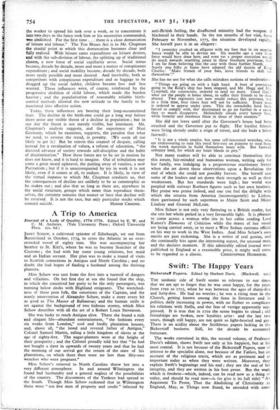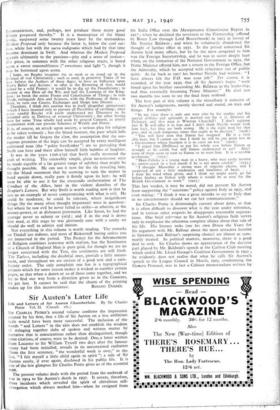Swift: The Happy Years
Bickerstaff Papers. Edited by Herbert Davis. (Blackwell. 12s.) THE sardonic side of Swift seems so relevant to our times that we are apt to forget that he was once happy, for the years from 5702 to 1752, when he was between the ages of thirty-five and forty-five. He had no worries ; he was a rising man in the Church, getting known among the lions in literature and in politics, daily increasing in power, with no Esther to complicate his relations with Stella, and the fear of vertigo apparently sup- pressed. It is true that in 1710 the scene begins to cloud ; old friendships are broken, new loyalties arise: and the last two years, though still happy, are not quite so light-hearted and gay. There is an acidity about the Scriblerus papers lacking in the Bickerstaff business. Still, let the decade be accounted fortunate.
The works contained in this, the second volume, of Professor Davis's edition, shows Swift not only at his happiest, but at his most central. It is not because of the Bickerstaff Papers, now of interest to the specialist alone, nor because of the Tatlers, but on account of the religious tracts, which are as pertinent and as important today as when they were written. Moreover, they explain Swift's beginnings and his end ; they are the seal of his integrity, and they are written in his best prose. But the work which is freshest—which, indeed, can be read now as a thing of today, and should be read now—is (to give it its full title) " Argument To Prove, That the Abolishing of Christianity in England, May, as Things now Stand, be attended with some
Inconveniences, and, perhaps, not produce those many good Effects proposed thereby." It is a masterpiece of the bland ironic, surpassed some twenty years later by the tremendous Modest Proposal only because the latter is, below the cool sur-
face, white hot with the saeva indignatio which had by that time become dominant in Swift. And whereas the Modest Proposal appeals ultimately to the passions—pity and a sense of justice— this piece, in common with the other religious tracts, is based upon a sweet reasonableness (" sweetness and light "), though it may be bottomed upon scorn.
I hope, no Reader imagines me so weak as to stand up in the Defence of real Christianity ; such as used, in primitive Times (if we may believe the Authors of those Ages), to have an Influence upon Men's Belief and Actions: to offer at the Restoring of that, would indeed be a wild Project: it would be to dig up the Foundations ; to destroy at one Blow all the Wit, and half the Learning of the King- dom: to break the entire Frame and Constitution of Things ; to ruin Trade, extinguish Arts and Sciences, with the Professors of them ; in short, to turn our Courts, Exchanges and Shops into Deserts . . . Therefore, I think this caution was in itself altogether unnecessary [which I have inserted only to prevent all Possibility of cavilling), since every candid Reader will easily understand my Discourse to be intended only in Defence of nominal Christianity ; the other having been for some Time wholly laid aside by general Consent, as utterly inconsistent with our present Schemes of Wealth and Power.
It is, of course, an attack upon society, a serious plea for religion to be taken seriously ; but the bland manner, the purr which lulls the reader till he forgets the claw, the assumption that the out- rageous premises of the logic can be accepted by every intelligent cultivated man (the " polite freethinker ") are so pervading that Swift can here and there allow himself little bubbles of laughter.
It was in the years 1706-1708 that Swift really mastered the craft of writing. The ostensibly simple, plain no-nonsense style he made capable of a far greater range of subtlety than might be thought possible. He can use it now for the sly revealing hint,
for the bland statement that by seeming to turn the matter in hand upside down, really puts it firmly upon its feet: he will soon be able to use it for the crescendo orchestration of The Conduct of the Allies, later in the violent diatribes of the Drapier's Letters. But why Swift is worth reading now is that he sets us an example of never compromising with what is evil. He could be moderate, he could be tolerant, where insignificant things (by the many often thought important) were in question : but where he saw evil he never failed to strike—at atheism, at the money-power, or at dishonest pretension. Like Satan, he had the courage never to submit or yield ; and if in the end it drove him mad, at this stage he was gloriously sane with a sanity we
should do well to admire and imitate.
Not everything in this volume is worth reading. The remarks on Tindall are tedious, and most of Bickerstaff boring unless you are immersed in the period. The Project for the Advancement of Religion combines nonsense with realism, but the Sentiments of a Church of England Man is pure gold, for though we are no longer concerned with the Test, the sentiments are still fresh. The Milers, including the doubtful ones, provide a little amuse- ment, and throughout we are certain of a good text and a satis- factory order. The only complaint one has is a typographical artiness which for some reason makes it wicked to number certain pages, so that when a dozen or so of these come together, and we try to find our way from a direction given us in the Contents, we get lost. It cannot be said that the charm of the printing
makes up for this inconvenience. BONAMY DOBREE.































 Previous page
Previous page